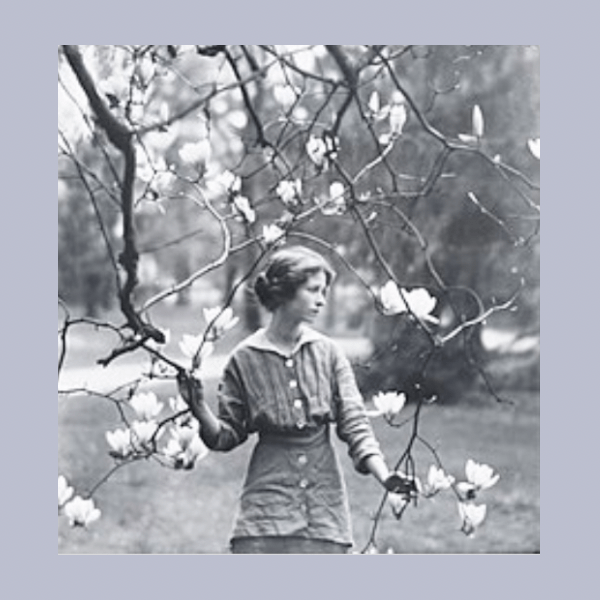Edna St. Vincent Millay. Nace en Rockland, Maine, Estados Unidos. (1892-1950). Fue poeta, dramaturga, libretista y además feminista, fue bisexual, una de las poetas más exitosas y valorada de Los Estados Unidos de su tiempo. A los catorce años fue condecorada con la Insignia de Oro de San Nicolás de Poesía y a los quince le fueron publicados varios poemas en revistas juveniles y en la prestigiosa Anthologie Current Literature. Gana el Premio Pulitzer de Poesía en 1923. por «The Ballad of the Harp-Weaver». Respetada por sus Sonetos, fue Bohemia e irreverente. Se preciaba de ser una gran lectora. Su poema “Renacimiento» y sus lecturas de poesía le valieron un gran reconocimiento. En 1943 fue la sexta persona y la segunda mujer en ser condecorada con la Medalla Robert Frost por su contribución de por vida a la poesía americana. En Nueva York en Steepletop lugar donde Edna pasó sus últimos años de vida, hay un museo dedicado a la poeta.

EXILIADA Buscando en mi corazón el verdadero motivo de su pena, esta fue la causa que hallé: que estoy cansada de las palabras y las personas, enferma de la ciudad, deseosa del mar; deseosa de la dulzura salada y pegajosa del viento fuerte y la espuma quebrada, deseosa del sonido fuerte y el sonido suave del gran oleaje que rompe todo el día. Siempre antes frente a mi patio, marcando el alcance del mar de invierno, arraigado en la arena y arrastrando maderos, rezagando las flores moradas del guisante silvestre. Siempre montaba la ola en la mañana, sacudía la area de mis zapatos en la noche, y ahora estoy atrapada debajo de edificios grandes, golpeada por el ruido, confundida con la luz. Si yo pudiera escuchar el gemido de los pilotes verdes. Bajo los muelles de madera mecidos por el viento, ver una vez más los barriles oscilantes, y los maderos negros que rodean los aliviaderos; si pudiera ver los mejillones barbudos incrustados en los cascos naufragados y podridos, oír una vez más los chillidos hambrientos de las gaviotas dando vueltas sobre mi cabeza; Sentir una vez más la choza estremecida bajo el cambio de la marea, temer una vez más la avenida de agua que sube, el pavor de la campana en la niebla allá afuera, ¡sería tan feliz! —eso era felicidad— pasar todo el día en la costa de Maine. Tengo necesidad de tener y mantener conchas y anclas y botes otra vez. Me haría tan feliz, que soy feliz. Nunca antes desde que llegué aquí. He estado tanto tiempo lejos del agua; tengo necesidad de estar cerca del agua.
EXILED Searching my heart for its true sorrow, This is the thing I find to be: That I am weary of words and people, Sick of the city, wanting the sea; Wanting the sticky, salty sweetness Of the strong wind and shattered spray, Wanting the loud sound and the soft sound Of the big surf that breaks all day. Always before about my dooryard, Marking the reach of the winter sea, Rooted in sand and dragging driftwood, Straggled the purple wild sweet pea. Always I climbed the wave at morning, Shook the sand from my shoes at night, That now am caught beneath big buildings, Stricken with noise, confused with light. If I could hear the green piles groaning. Under the windy, wooden piers, once again the bobbing barrels, And the black sticks that fence the weirs; If I could see the weedy mussels Crusting the wrecked and rotting hulls, Hear once again the hungry crying Overhead, of the wheeling gulls; Feel once again the shanty straining Under the turning of the tide, Fear once again the rising freshet, Dread the bell in the fog outside, I should be happy!—that was happy All day long on the coast of Maine. I have a need to hold and handle Shells and anchors and ships again. I should be happy, that am happy. Never at all since I came here. I am too long away from water; I have a need of water near. Edna St. Vincent Millay Traducción: Melania Suárez



